…its resistance to the science & technology of social control
CONSTANT UPDATES HAVE NOW BEEN MOVED HERE
The almost universally-held discourse that the movement in Hong Kong concerns only the people of Hong Kong, China and the Chinese diaspora conveniently ignores the essential: its more general implications for the rest of the masses of individuals throughout the world. Whilst factors specific to Hong Kong are the inevitable catalyst for this movement, implicitly central to it is a resistance to modern forms of science & technology in the service of intensified totalitarian social control – certainly not something that only concerns the Chinese.
我们自己奋斗吧
(see also this interesting Crimethinc interview with Hong Kong anarchists about current events and some of Hong Kong’s history)
See comments boxes below for updates
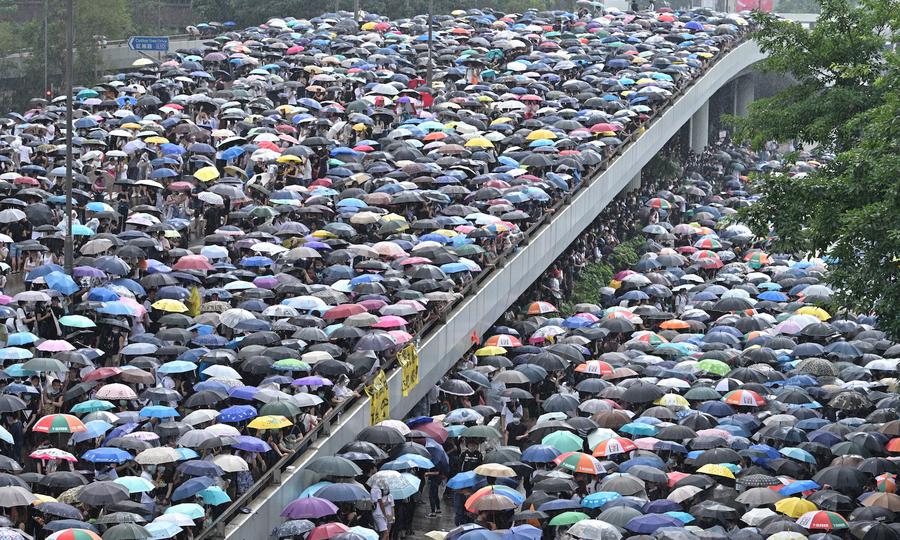 On Wednesday 12th June, when someone shouted out that drones had started flying above them, everyone opened up their umbrellas almost simultaneously
On Wednesday 12th June, when someone shouted out that drones had started flying above them, everyone opened up their umbrellas almost simultaneously
The current opposition to Hong Kong’s proposed extradition law i (temporarily suspended) is also an implicit opposition to the obvious intensification of totalitarian control that is central to China’s current method of maintaining class power, primarily involving the application of science to vastly intensify hierarchical power. An underlying thread running throughout this movement is a resistance to the development of technologically-equipped social control, though in a confused and contradictory manner. This is no tenuous link – opposition to the looming technologically-equipped terror is at the back of the minds of many of the protesters and is at the semi-conscious root of much of its motivation, even though this is not always clear or explicit. This is certainly implied by this report from June 14th: “…a recirculated South China Morning Post report from last December has sparked concern that a visit to Xinjiang [Muslim Uighur region where at least 10% of the population are in education camps] by Hong Kong anti-terror police, ostensibly to learn rapid incident response methods, may be a sign that HK authorities may have been importing ultra-repressive security measures from the region.” And these fears are explicitly stated by some of those involved in the Hong Kong movement: “Hong Kong’s tech-savvy protesters are going digitally dark as they try to avoid surveillance and potential future prosecutions, disabling location tracking on their phones…Who knows if it would become like Xinjiang the day after tomorrow, because things can change so quickly”.
One can see an aspect of this also in the use of umbrellas to hide from drones ii. Another has been the avoidance of electronically traceable railcards by those going to the demonstrations: “Many of the protesters …took pains to keep from being photographed or digitally tracked. To go to and from the protests, many stood in lines to buy single-ride subway tickets instead of using their digital payment cards, which can be tracked…” (here). And here: “Local Hong Kong residents almost never use these ticketing machines these days to buy single-journey tickets. For starters, everyone has a rechargeable smart card, called the Octopus card, that is widely used across the city to pay for everything from transport to meals and groceries. Purchasing a physical ticket not only takes time, it also costs more than the equivalent trip paid for with the Octopus card. The protesters’ deliberate decision to use cash, despite its seeming inconvenience, also shows how increasingly cashless societies can present dire privacy concerns.”
Nevertheless, many used the supposedly encrypted mobile chat app Telegram, oblivious to the fact that the state (both that of mainland China and Hong Kong) have long ago hacked this app (see this). “Telegram is not more secure than Whatsapp. In many circumstances, it’s worse….its encryption features, were highlighted by tech media as one of its big selling points. Despite its reputation, many conversations on Telegram are not end-to-end encrypted — in other words, not secure. And to make matters worse, the company has developed a reputation for problems with its technology that have led some users to have their information and messages exposed, in some cases to other users. Over the past year, Global Voices has reported on multiple instances of Telegram users running into serious trouble with the app’s security. Telegram users in Russia — some of them journalists and activists — have reported that their accounts were hacked. Another user in Ukraine reported receiving private group messages through her Telegram app for a group that she was not part of. And there has been concern in Iran about the company’s compliance with government requests for certain material — bots mainly — to be blocked on the platform.”
An underlying fear of the movement in HK is the totalitarian nature of China and its use of surveillance technology to repress dissidence before it hits the streets, schools, universities or workplaces. Such technology is already being used to a lesser degree in Hong Kong: people have been arrested merely for discussing organising the protests on their smartphones (for just one example, see this). Surveillance technology is the constant fear – “Even if we’re not doing anything drastic — as simple as saying something online about China — because of such surveillance they might catch us”…Many said they turned off their location tracking on their phones and beefed up their digital privacy settings before joining protests, or deleted conversations and photos on social media and messaging apps after they left the demonstrations…Anxieties have been symbolised in a profile picture that was being used by many opponents of the bill: a wilting depiction of Hong Kong’s black-and-white bauhinia flower. But protesters have become increasingly nervous that using the picture online could attract attention from authorities and have taken it down” (here)
Some of the confusions and limitations of this movement are obvious. For example, there’s an illusion that the extradition law will stop foreign investment in Hong Kong – “We’re afraid that in the future we won’t have jobs to go to”, some teenagers have said. Nonsense, of course. Whilst some individuals working for businesses may feel reluctant to go there, companies as a whole nowadays have no compunction about complying with mainland China (and, of course, this is independent of any basic critique of jobs, of the misery of wage labour). And sadly, this illusion detracts and distracts from the main reason for this movement – their resistance to impending totalitarianism. This resistance can certainly not be won if they somehow believe that they can rely on the wafer-thin margin of freedom expressed in the lesser forms of totalitarianism implicit in current bourgeois democracy. iii Whatever obviously totalitarian countries pursue is merely one step ahead of the ‘democracies’, which slowly but surely also develop similar methods of social control, constantly obscured, however, by the language of « rights ».
Joshua Wong, one of the leaders of the 2014 Umbrella Movement, who was recently released from prison, possibly to calm things down, has written “As American security and business interests are also jeopardized by possible extradition arrangements with China, I believe the time is ripe for Washington to re-evaluate the U.S.–Hong Kong Policy Act of 1992, which governs relations between the two places. I also urge Congress to consider the Hong Kong Human Rights and Democracy Act. The rest of the international community should make similar efforts. A victory for Beijing is a victory for authoritarianism everywhere. Keeping an eye on this place sends an important message to Chinese authorities that democracy, not authoritarianism, is the way of the future. It also keeps our hopes alive knowing that we are not fighting alone.” This is the kind of rubbish one would expect from a politician, however apparently ‘dissident’ (he’s secretary-general of the pro-democracy party Demosistō). Apart from the fact that it takes sides in the cold (and potentially hot – check out tensions around Taiwan) war between China and the USA, it’s a typical example of the current colonisation by dominant language – phrases such as “international community” which merely means the international “community” of capitalists, whether state capitalists or individual capitalists. This is the “community” of the commodity which Wong clearly hopes to have a political niche in. And of course, his contrast between ‘democracy’ and ‘authoritarianism’ nowadays makes little sense – democracies everywhere are becoming increasingly authoritarian and we hear of so many new examples almost every day that this text would run to 1000s of pages if I were to list every one of them over the last few years – it’s sufficient to note the ones mentioned here and there throughout this text. But so far there’s a difference between authoritarianism and totalitarianism, even though it’s also vital to realise that totalitarianism grows out of the polluted soil of authoritarianism.
The ideology of self-determination put forward by his party is an ideology that’s been around since President Wilson advocated it as a tactic in the US’s struggle for imperialist hegemony at the end of WWI, an ideology where the vast majority of “selves” determine nothing. And besides, no rulers of any state can determine their country independently of the pressures of the global market. Wong’s appeal to the US state contradicts this ideology of ‘self-determination’. The constant shifts, between the various capitalist states, from rivalry to complicity, from competition to alliance, and back again, the inevitable product of the different states’ balance between mutual dependence and rival economic interests, means that the US can’t be relied on even as an ally of those aiming to mobilise (some of whom want to eventually rule) Hong Kong against the rulers of China. After Tiananmen Square, the US imposed sanctions on China, which however, did not stop George Bush snr. from secretly doing deals with the Chinese bureaucracy immediately after the massacre of at least 10,000 Chinese workers and students. And at the end of May this year, just a few weeks ago, the Belgian state, through its Beijing embassy, in an unprecedented move, called on the Chinese police to arrest and disappear a family of Muslim Uighurs seeking visas to enable them to reunite with the father of the family in Belgium: “Belgian officials say their small country can’t risk offending China“. When Wong refers to the “international community” and “knowing that we are not fighting alone” he’s encouraging illusions in so-called allies who will, if convenient, stab such ‘friends’ in the back.
“Not fighting alone” can only be developed by striving to recognise and act on the connections between different struggles amongst those who are fighting their own states and bosses and the market system not only in mainland China but also throughout the world.
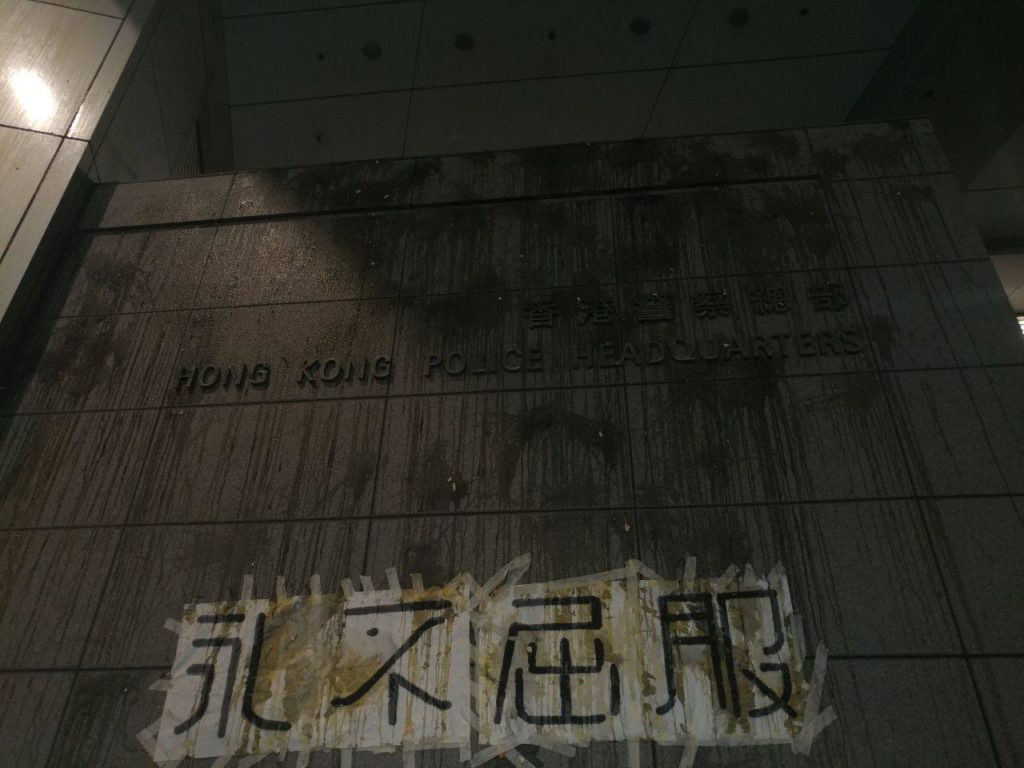 The front façade of the Hong Kong Police HQ in Wan Chai,after being splattered with eggs on the evening of Fryday (my eggscuses for the rotten yolk) June 21. Hundreds of protesters sealed the entrance, demanding the unconditional release of every person that has been arrested in relation to the struggle thus far. The banner below reads “Never Surrender.” Photo by KWBB from Tak Cheong Lane Collective.
The front façade of the Hong Kong Police HQ in Wan Chai,after being splattered with eggs on the evening of Fryday (my eggscuses for the rotten yolk) June 21. Hundreds of protesters sealed the entrance, demanding the unconditional release of every person that has been arrested in relation to the struggle thus far. The banner below reads “Never Surrender.” Photo by KWBB from Tak Cheong Lane Collective.
Do Chinese Bureaucrats Dream Of Electric Sheep? –
China as world leader in the development of technological social control
Despite providing interesting information, it should be obvious that the democratic discourse of the above video is as much a problem for those who seriously want to change the world as the developing totalitarianism of mainland China.
The fear of Hong Kong becoming more like the mainland is also engendered by knowledge of the advances there towards the most totalitarian use of social control technology in history. For the few reading this who don’t know – in a year’s time the state there will have completed its database of the whole of the population, a database intended to standardise the assessment of everyone’s economic and social reputation, or ‘Social Credit’: a database of every individual’s recorded incident from the cradle to the grave. Some aspects of this ‘social credit’ system are already being used ‘voluntarily’ in apps in China by a combination of both the state and private industry, called « new forms of behavioral incentivisation. » .
Already, in the Muslim Uighur area, one of the areas that in the past that has had significant revolts against the Chinese authorities, the Chinese bureaucracy is collecting the DNA of most of the Uighur population (see also “the myths of dna”). The state is also demanding that “all neighborhood households’ cutting tools with blades exceeding 10 centimeters …have QR codes embossed on them“, and enforcing this demand by the use of spot ‘security checks’ (perhaps even by China’s new Dalek-cops).
 Xinjiang knives could clearly be used to slit the throats of China’s new cops (below)
Xinjiang knives could clearly be used to slit the throats of China’s new cops (below)
China is universally recognised as the world’s no.1 country in the production of the technological means of social control. The cops there now have sunglasses with in-built facial recognition technology to facilitate the rulers’ law enforcement. Not only is facial recognition surveillance capable of picking out a wanted individual amongst a crowd of 60,000, but their facial recognition cameras are now starting to be used in school classrooms because they can also recognise a person’s mood : anxious, furtive, scared, happy, disgusted, sad, surprised, angry, neutral, discombobulated or desperate-for-a-piss. “The system has been touted as a way to ensure students are attentive and happy, learning quickly and, ultimately, scoring well on tests.” In addition, schoolkids are obliged to consult an app on their phones mixing information with Xi Jinping Thought. “Schools are shaming students with low app scores. Government offices are holding study sessions and forcing workers who fall behind to write reports criticizing themselves. Private companies, hoping to curry favor with party officials, are ranking employees based on their use of the app and awarding top performers the title of “star learner.” Many employers now require workers to submit daily screenshots documenting how many points they have earned.” (here).

Fortunately, some Chinese people have not been so intimidated as to avoid speaking out against this suffocating development – ”This technology is so twisted. It’s anti-human,” said Zhang Jing, a 23-year-old photographer who spoke out online about the Hangzhou classroom. He envisioned a future where teachers demand students to smile in class and “then there’s no difference between students and robots, right?” (same article).
China now has school uniforms that, along with the ubiquitous facial recognition, track students’ comings-and-goings, which make truancy almost impossible. Whilst facial recognition cameras in the classroom inform teachers if a student has fallen asleep in class in case they hadn’t noticed (but this is very unlikely considering how thrilling their studies are – “primary school textbooks may soon include definitions for terms like “price-to-earnings ratio” or “buy and hold”).  And in certain areas, sanitation workers are being required to wear GPS-tracking smart bracelets to not only monitor their location at all times, but audibly prod them if they stop moving for more than 20 minutes. And just in case you think that this is merely an example of the development of totalitarianism in China alone, take a look at this development in Canada, only in its initial stages: “Researchers at UBC Okanagan’s School of Engineering have developed a low-cost sensor that can be interlaced into textiles and composite materials. While the research is still new, the sensor may pave the way for smart clothing that can monitor human movement. The embedded microscopic sensor is able to recognize local motion through the stretching of the woven yarns that are treated with graphene nanoplatelets that can read the body’s activity”.
And in certain areas, sanitation workers are being required to wear GPS-tracking smart bracelets to not only monitor their location at all times, but audibly prod them if they stop moving for more than 20 minutes. And just in case you think that this is merely an example of the development of totalitarianism in China alone, take a look at this development in Canada, only in its initial stages: “Researchers at UBC Okanagan’s School of Engineering have developed a low-cost sensor that can be interlaced into textiles and composite materials. While the research is still new, the sensor may pave the way for smart clothing that can monitor human movement. The embedded microscopic sensor is able to recognize local motion through the stretching of the woven yarns that are treated with graphene nanoplatelets that can read the body’s activity”.
Moreover, China’s voice recognition technology as a means of social control is certainly going to be developed way beyond its borders. And whilst voice recognition is paraded as simply a tool for ‘writing’ without using one’s fingers, its use for the police is obvious (though so far, it’s a rather haphazard tool, since disguised accents can fool it, and also voices can be scrambled). And there are also certain areas where you can only get toilet paper if you’re on the facial recognition database, apparently aimed at preventing toilet paper theft and rationing toilet paper use. If Orwell’s 1984 had envisaged a world where Big Brother restricted how much paper you used to wipe your arse and knew how often you took a shit he would have been thought of as deliriously absurd.
In parts of the country, facial recognition is used to shame the horrific crime of jaywalking: “The public shaming has very visible effects …being publicly shamed could impact a person’s credit rating, as well as their insurance and pension premiums. “.
China’s state even uses “Minority Report”-type predictive policing for those they believe will commit what they have designated as a crime.
Orwells That Ends Well:
From China to the rest of the world
“This is not just about Xinjiang or even China — it’s about the world beyond and whether we human beings can continue to have freedom in a world of connected devices…It’s a wake-up call, not just about China but about every one of us.’’ – quote from this article about the horrendous affects of predictive policing in China’s Uighur areas
So don’t delude yourself into thinking that these developments will remain purely within China’s borders. Predictive policing technology, for example, is being taken up by police departments throughout the world. Moreover, China’s social credit system “could interfere in other nations’ sovereignty” (ignore the ridiculous title – the notion of national sovereignty has always been dubious, even within its own bourgeois terms). On top of all this, China’s renowned use of internet censorship is being increasingly adopted throughout the world. And just the other day, on 19th June, Google rejected attempts by many of its shareholders to close down its “Project Dragonfly”, a censorship- and surveillance-enabled search engine designed to facilitate the company’s return to the Chinese market. ivIn Germany, the state closed down Indymedia in August 2017, saying that they were intent on destroying the German Constitution iv2. And now the UK could well be bringing in a law allowing for “North Korean-style censorship” . Sure – they often overkill with excessive suggestions to test the water before a bill is debated so that when they finally re-phrase some of the more obviously draconian features they can show they’ve “listened”, but bit by bloody bit internet – and other – censorship is very obviously on the increase in the demockracies. v
Countries and institutions outside of China constantly and hypocritically condemn the move towards totalitarian social control in China in order to make a show of differentiating their ‘freedoms’ from more overtly repressive conditions. And to more insidiously develop similar repressive controls hidden behind this show of contrast. Behind this show, in practice capital outside China needs China’s vast mutual trade and investment – e.g. the Belt & Road/Silk Road initiative, embraced especially by the far-right Italian government and France’s neoliberal onevi, though it also involves infrastructure development and investments in 152 countries and international organizations in Europe, Asia, the Middle East, South America and Africa. Meanwhile sections of capital outside China are eager to develop similar surveillance technologies and are both supplying much of them to China as well as buying them from there (see, for example this and this). At the same time, Chinese internet censorship methods are being exported throughout the world (for some of their methods, see this about censorship of the protests in Hong Kong and this about censorship there generally), and increasingly it’s being acknowledged that its surveillance techniques are also being exported everywhere.
‘Mood recognition’ camera technology is not in any way confined to China but is being developed elsewhere, though not always directly in the form of forms of legal or state-initiated repression but as a method of market research and consumer manipulation. “A supermarket might use it in the aisles, not to identify people, but to analyse who came in in terms of age and gender as well as their basic mood. It can help with targeted marketing and product placement.” (here). But there are, outside of China, the usual ‘law enforcement’ uses for such Big Brother technology: “UK firm WeSee, for example, claims its AI tech can actually spot suspicious behaviour by reading facial cues imperceptible to the untrained eye. Emotions, such as doubt and anger, might be hidden under the surface in contrast to the language a person is using. WeSee says it has been working with a “high profile” organisation in law enforcement to analyse people who are being interviewed.” (same article). As if this wasn’t enough to maintain repressive social control, the Chinese state is now developing ‘gait recognition’: “…the system can identify people from up to 50 meters away, even with their back turned and their face covered. “Gait analysis cannot be fooled by simple limping, walking with splayed feet or hunching over, because we are analyzing all the features of an entire body”. In the meantime, before such technology is fully developed, “the police can use hand-held devices to search smartphones for encrypted chat apps, politically charged videos and other suspect content” (here). And in Xinjiang residents are forced to install surveillance apps on their mobile phones.
Of course in the ‘democracies’ such crude coercion is not used to force smartphones onto people in the same way. Nevertheless, for increasing kinds of means of survival, smartphones are as “compulsory” as cars have become for many in this society – no Deliveroo rider or Uber taxi driver or care worker would hold onto their jobs for longer than 10 minutes without one, and there are certainly many other forms of wage labour that require them. And they surveille all movement, to the point where it’s impossible, if you want to hold down your job, to not conform to a kind of modern form of utterly isolated individualised time and motion control where the smartphone polices your speed, your time of arrival and departure and probably more. Of course, in democracies such wage labour is “voluntary” – wage slavery is not like slavery but allows you “freedom”, to use a word favoured by liberal ideologists, evasively contemptuous of the condition of those who have no other way to survive but to sell their labour power. Sure, you can try to avoid using smartphones for anything that might draw the attention of the state, but if the state already has you in its crosshairs, it still has your phones at home and at work to tap.
At the same time, the smartphone is not just a means for the most obvious forms of social control such as police surveillance. It’s also a mediation of immediate relations and is thus also a way of being sucked by specialised effects and other artistic forms into a distraction from non-virtual human contact. In the democracies, smartphones are not compulsory yet. But people get hooked on them – seduced by the attraction of endless applications of narrow aesthetic ‘subjectivity’ – and then, like all drugs, are finally controlled by and through them. Whilst with the more normal notion of what constitutes a drug habit, being controlled by drugs is subjective and can, with effort and a sense of purposeful perspective, be resisted and eventually kicked, in the case of addiction to technological toys, the control is not just subjective, voluntary, not just dependent on will. It’s not just you watching Big Brother but Big Brother Watching You 24/7.
There’s been, in the UK, in the development of electronic tagging (the ‘nice’ alternative to the totalitarian panopticon of prisons) a device that can monitor adrenalin, alcohol and anger levels, and heightened tension (see this: Prison Technologies STOA Report). And I’ve heard, in the US, that there’s a personal yoga meditation program available which monitors your moods – priceless data about someone that would be easy for the state to hack into. How much more invasive is it possible to get? These technologically-based elements are clearly pieces constituting an enormously enhanced system of social nano-control, one that was always embedded in capitalism’s project of what Castoriadis referred to as “pseudo-rational pseudo-control”, but which, as the world falls increasingly into ecological collapse, wars and crisis, can and will – insufficiently contested – be justified as a means of “maintaining order”.
Of course, the powers-that-be invariably present themselves as far more omnipresent, omnipotent and omniscient than they in fact are in order to induce a soul-destroying resignation amongst those who might be tempted to revolt against their power. It should be made clear that one of the strategies of the state – for a long time – has been to make people think that the state is like a materialist God – it knows and controls everything. Its presentation of itself is intended to instil absolute resignation: “You can’t beat the system”, as a widely-distributed ad warning against fare-dodging on the tube put it – in London as far back as the 1980s! Although the means available to it now is far vaster, petrification – terror and submission – in the face of it all is what the rulers want above all, as if the technological means of absolute control at the disposal of the state is perfect, regardless of how much, in fact, it is. As this article says about America’s accumulation of data by the NSA: “…while capturing and storing data is easy, data by itself is not information. The NSA’s enormous capability to intercept data has not been matched by any corresponding ability to analyze it, much less to act on whatever information is extracted. Data mining has shown some promise in keeping track of known suspects, but has been nearly useless at uncovering new ones. The forces of order are therefore left to wrestle with unmanageable masses of data on people who are little threat to them, while those harboring nefarious intent can slip beneath the radar merely by taking some basic precautions”.
So, in relation to facial recognition cameras, awareness of how social control technology works can help you consciously alter your image and behaviour. Actors know full well that gait can be disguised by imitation of others and not just something you can disguise by the far-too-simple use of limping, walking with splayed feet or hunching. Actors know full well that mood can be consciously repressed, for example by recalling situations one has lived other than the real life actually being lived, or imagining and empathising other people’s situations. Such professional techniques can be used outside any professional career, in daily life, by those who have developed a certain distance from their own habitual facial expressions and body language, though of course, this reduces the element of spontaneity in resistance to external authority: one has to always calculate a risk well beforehand, though some aspects of calculation can become easy routine habits with constant repetition. As for facial recognition’s ability to see a discrepancy between one’s words and one’s micro-expressions, in certain circumstances/countries one can still refuse to talk to law enforcement agencies. And refusing to be sucked into the dead-end of consumerism, and to predictable consumer habits, can enable people to avoid being seduced by “targeted marketing and product placement”. Nevertheless, this remains a purely individual solution under siege to the watchful eye of the state constantly looking at every breath you take, every move you make, every step you take, every single day, every word you say, every game you play, every vow you break, every smile you fake, every claim you stake. Despite the danger of over-estimating such technologies, there’s also a danger in under-estimating them: it’s well-known that the thought of being constantly surveilled causes an enormous amount of stress, which wears and tears at each person (there are even some people who cover the camera on their mobile phones for fear of having their every activity monitored, even though they don’t even do anything or discuss anything illegal). As previously said, totalitarianism, any more than any other ism, is never a completed goal – there were even revolts in the Nazi’s concentration camps and in Stalin’s gulags (e.g. this). But it certainly is a process constantly capable of extension and intensification.
Holidays in your own misery:
Totalitarian leisure
It has to be made clear that the development of totalitarian technology is also already pervasive in areas of life considered to be ‘free’. As a compensation for being robbed of the freedom to change your world and your life, you are granted the freedom to change compensations. Such compensations turn communication into its opposite with those “feeds” or supposedly personalized “suggestions” and “recommendations” pushed on you by Smartphone apps, Youtube, Facebook vii et al. or disguised as articles (those “Around the Web” and “Recommended For You” boxes at the bottom of many online news articles, created by advertising companies such as Taboola etc.), who ask you over and over again and without your initiative, to pick and choose from what they have “for you”, creating by this the habit of staying within the comfort of their clickable bosoms. What was once a personal and passionate exploration of thoughts and knowledge that began by your own initiative, of which an important part was the social exchange of recommendations and ideas between people who actually know and communicate with each other – a direct experience that could lead to discussion and to a mutual development of the people engaged – has, for the obedient spectator who’s only inquisitive about what this society deems acceptable to be inquisitive about, been eliminated and replaced by an isolated and unilateral absorption of material intentionally designed to serve itself and to be consumed repeatedly: easy-to-access (directly available at any moment, especially those moments of void, when boredom or anxiety kick in), easy-to-process, having a harmless, purely entertainment/educational/commercial value, as well as leaving no room for surprises, chance and the unpredictable. What we have here is a vertical edification, identical to all, of which the form guarantees that the content remains confined to the limits of the form. These platforms (and the capital and exploitation behind them) derive their full power precisely from isolation and passivity, and they create isolation and passivity in return. This may not seem like direct censorship, but its effects on mental capacities and social relations are often even worse.
“If I have only an historical knowledge of thought, truths, and facts, they are outside my spirit; i.e. for me they are dead; my thinking and my spirit is not in them; in them my thought is not present, and my inmost being is not there either. The possession of purely historical facts is like the legal possession of things I do not know what to do with. If someone stops at the mere knowledge of what this or that man has thought, of what has been handed down, then he has just handed himself over and renounced what has made him a man, namely his thinking. In that event he is preoccupied solely with the thinking and the spirit of others; he investigates only what has been true for others.” – Hegel, Introduction to the Lectures on the History of Philosophy.
An endless amount of pieces of information are streamed, uploaded, broadcasted or talked about in Youtube-channels, Facebook-live and similar platforms – but on the condition that they remain pieces of information or entertainment, that they remain details. They then (or while you’re watching them) immediately recommend you to continue and click on other sources of the same kind, so that you will never be out of the loop. Only what is telegenic is allowed, that which can represent or sell an already existing object or concept that can be regurgitated by specialists, stars or “influencers” (be it a news-event, a commodity, a type of personality, an ideology, a moral attitude, fascism: yes or no, anti-fascism: yes or no, leftism, veganism, a new and “correct” way to say something, a lifestyle, a “real-life story” to be watched alone at home as a compensation for your lack of real life…); only then can this information be given a fixed and official rank of quantitative importance in the spectacle, creating mini-worlds of bits-and-pieces with which you have to be familiar; information-things or culture-things separated from each-other or with only one fixed and official relation to each-other, with the result that you would never be able to think dialectically about anything around you, including yourself and your life, to develop a subjective understanding of your world, of the causes of, the need for or the use of what is shown to you, of what is really desirable for you or not.
What is now called thinking is not really thinking at all; it has long ceased to be the process of thinking for yourself – a creative, passionate and at times frightening, conflicting and difficult activity – and has been replaced with merely having consequence-less opinions about what goes on in an existing and unchangeable reality, to which you are only coincidently related (usually when the need arises to make you feel guilty about something or to mobilize you for or against a person or a group). This type of “censorship” works in a circular way: it informs you about a supposed reality about which you are only supposed to have an opinion, in which you are only supposed to take a passive part, and by this effect strengthening that same forced passivity and ensuring the past’s domination over the future. [my thanks to T. for most of the previous 4 paragraphs, very slightly re-written by me]
Will we rage against the machine…
« A report by Ant Financial’s much-maligned social credit system (SCS), Sesame Credit, indicates that 96% of Chinese users born between 1990-1994, and 94% of those born between 1995-1999 have chosen to opt in to the social credit system. » – here
“I couldn’t tell which terrified me more: China’s all-encompassing network of facial recognition surveillance cameras, or that my countrymen were proudly cheering them on… Many people in China seem to be happy about the physical security promised by the surveillance network. Our mind-set, long ago, was wired to see safety and freedom as an either-or choice. Huawei’s Hong-Eng Ko put the public safety argument more bluntly this week, arguing that “if privacy wins, criminals win.” The acceptance Qian describes is mirrored in widespread public support for China’s various emerging social credit systems as mechanisms of accountability for untrustworthy behavior, as found by Genia Kostka through surveys and Manya Koetse through analysis of social media discussion.” – here
The final subhuman product of the system: docile spectators hoping to eradicate everything in themselves and in others that doesn’t reduce them more and more to the level of a predictable machine, who are nervous if they don’t think they are being supervised, deludedly dreaming of being defended by the very world that destroys all security. One of the first orders of any revolutionary movement is to make this type of subhuman impossible and to spare no instance in which they can be denounced, demeaned, denigrated, and subjected to condescending pity, while taking every pain to praise and encourage them at whatever acts of rebellion they may belatedly engage in, and understanding that this is something that regularly happens to all of us because it is embedded in the civilization that we must destroy. The first revolutionary act is disobedience.
“The universe is simply a great machine…Man, like the universe, is a machine”
– Nikola Tesla (scientist, developer of the Alternating Current)
« …a scientist is …above all, a choice utterly submissive to the dominant reification of human beings, their reduction to a machine, to their role within the commodity economy which demands the repression of subjective desire, which demands their reduction to a functional machine within the overall process of exploitation and capital accumulation. Trial and error reduced to the fetishism of examining cells or natural elements, separating them, re-combining them, comparing and contrasting them, outside of their usual (natural or social) context, in a lab, narrowed such experiments to what is acceptable to quantifiable capitalist social relations. » –“Frankenstein’s Monster”
It’s not for nothing that scientists are helping China’s apartheid system in the Uighur region– science has always been an essential weapon of the ruling class.
Science has become the new religion, a materialised religion that creates the illusion of ‘order’, the order of machines, of ‘rationality’, of people too terrified to give their lives meaning by affirming themselves against an ‘objectivity’ and ‘order’ which escapes their grasp, which reduces them to commodities.
With the development of large industry, scientists were almost invariably loyal servants to their capitalist masters and to the commodity economy as a whole. Science in the early years of capitalist development invented for its bourgeois masters machines that gave them the spur to brutally expropriate the peasantry of its means of survival and force them to be wage slaves to the owners of these machines. Now this is being extended in more subtle, less blatantly crude, ways which further reduce the modern proletariat to a docility that no longer needs such openly horrendous methods to satisfy the rulers’ rabid thirst for capital accumulation. Today, in parallel to the development of Artificial Intelligence which hopes to make robots more ‘human’ and ’emotional’ (at least within the notion of ‘human’ and ’emotion’ created by a world aiming to repress the unpredictably uncontrollable and the negative) – human beings become more machine-like (though, unlike machines, they become depressed and mentally ill). In the past one might be forgiven for believing that science, in reaction to superstition and religion, had a liberatory potential – its progressive nature more linked to dreamt-of future possibilities than the immediately lived grim reality. Today, as science continues its logic of contributing even further to our “progress”, the progress of alienation, the progress towards the abyss, its ice-cold tentacles aim to strangle subjectivity at birth or even at conception. Science and capital aim to short-cut the conditioning process of family rearing, schooling and media manipulation and just stifle revolt when it’s only a twinkle in its creators’ eyes.
In July 2018, scientists endorsed the use of genome editing to engineer the traits of future children and generations. In August 2018 there was a report about scientists having discovered how to suppress the part of the brain that experiences anger and the desire for revenge. More recently (at the end of March 2019), scientists discovered the DNA of a genetic mutation that suppresses pain and anxiety. It also conveniently induces forgetfulness. Now imagine how the rulers of this society could use combinations of such insights and methods (assuming that these scientists, hoping to entice vast vault-loads of moolah, aren’t excessively exaggerating developments that are hardly beyond a wishful-thinking fantasy). Given their record of repressing anything that might threaten, even a little bit, their race to accumulate capital there’ll be nothing to stop them investing their surplus value in applying these discoveries to vastly intensify the passivity of those they govern. If it’s in their toy cupboard, it’s unlikely that they won’t eventually play with them. When ideological manipulation and technologically-induced fear proves inadequate, genetic and other forms of biologically-applied manipulation may well come to their rescue. No pain, no anxiety, no anger, no desire for revenge and no sense of life, because those surviving the ecological apocalypse will have forgotten why it all happened and who was to blame, having been genetically modified at conception. A Brave New Night of the pain-free Living Dead: chase all your cares away, Sing Hallelujah …get happy, get ready for the judgment day….Don’t worry – be happy.
Now, of course, these worst-case-scenarios seem like really over-the-top sci-fi, and doubtless reinforcing the separations inherent in class society and indoctrinating people with the ideological justifications that would support such a project would take a bit of time. However, the majority of human beings most of the time do not need to be genetically manipulated to be imbued with the values of the commodity economy. A report from February 2019 about people being prepared to sacrifice other human beings so that robots are not endangered shows how, as Artificial Intelligence develops, so too does reification, entailing, amongst other things, treating electronic objects as more important than human beings, and human beings as lesser objects. Which has long been the case amongst the rulers and their head-cracking cops, but is now being intensified amongst the increasingly atomised novelty-technology-obsessed masses. Thoroughly alienated humans, not content to get angry with people outside pubs for leaning against their precious cars, are now increasingly prepared to feed their robots and let people starve. And in future owners of the cars leant on will have no need to get angry – the cars themselves will get angry on their behalf, because machines can out-do people anyday.
Scientists may act all concerned and moralistic about certain developments (e.g. this), but the mercenary logic of scientists is not merely “indifferent” to such ‘moral’ questions (which they intermittently roll out to defend themselves against accusations of cold-heartedness), but, given that he who pays the piper calls the tune, the abstract ideology of knowledge-for-knowledge’s sake (and to hell with the consequences, other than the effect on their bank accounts) means in practice that most are prepared to sell themselves to absolutely anybody and any state.
And already totalitarian ecologists are waiting in the wings ready to harness all these marvelous new methods and inventions. And doubtless the world’s ruling class are ready to set up home in the South Pole in the lush countryside, whilst creating the mirage of a Green Earth for the rest of us. They will surely justify an ‘orderly’ totalitarian control as the only way to protect the planet, even though the result would be protecting a world of people reduced to machines and machines imitating such thoroughly predictable people so that machines and people become indistinguishable, with the result of further reducing the survivors to increasingly anxious survival sickness.
– Sam Fanto, June 23rd 2019
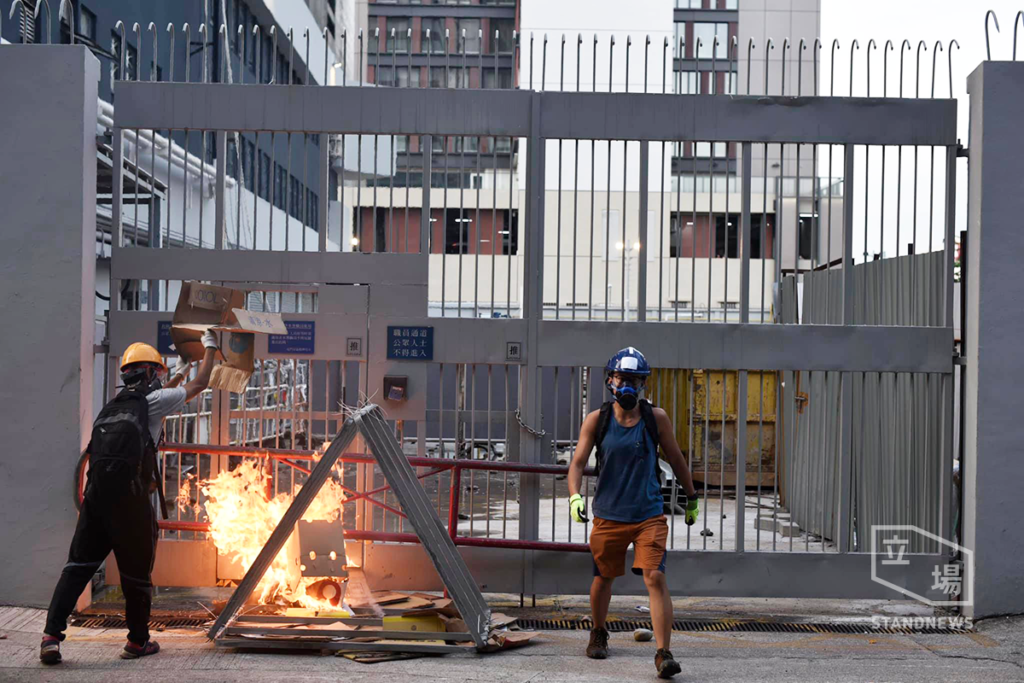 how to make a cold cop station warm and friendly
how to make a cold cop station warm and friendly
(5th August 2019)
My thanks to G for much of the input for this text
The aim of this text is to provoke discussion and, consequently, hopefully, practice. It’s by no means perfect, certainly not an attempt to be « definitive » long after the fact. Genuinely-motivated (ie not just point-scoring) critiques and elaborations welcome. These will mostly appear in the comments boxes at the end of this text.
For more on China see this
This academic Report on Current Situation Facing Chinese Youth Activists on the mainland is also worth looking at. Some quotes:
“The challenges Chinese youth activists face stem primarily from the escalation of political pressure in recent years. The unfavorable political reality has lead to a lack of resources…curbing their progress and preventing youth activists from advancing their careers and earning a living; the unfavorable political environment and work conditions have left youth activists with acutely poor economic, familial, and public support. In this vulnerable state, the proportion of activists suffering from clinical depression is fairly large”…”Many interview subjects feel pessimistic about the future of Chinese society… One said, “For the mainland, if you don’t take any violent action, if you don’t make any sacrifice of blood, then you can’t really accomplish anything”…”The extinction level crackdown on all sorts of activist groups has given the majority of activists personal experience of just how little possibility there is for civil society in China right now.”
Also worth looking at is Geremie R. Barmé’s site, despite its academicism. Barmé is often seen as the 21st century’s successor to Simon Leys/Pierre Ryckmans in terms of his knowledge of China.
For information on an anarchist group operating in Hong Kong during the 1970s and 1980s , see this (and for a sympathetic but critical take on them, see this )
See also this interesting Crimethinc interview with Hong Kong anarchists about current events and some of Hong Kong’s history
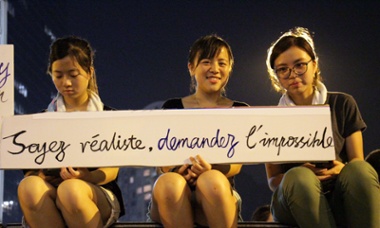
Hong Kong students with May ’68 slogan, from 29th April 2014
我们自己奋斗吧
Chronology of some of the events in Hong Kong
(updates in the comments boxes at the bottom of this page)
1/7/19:
China, Hong Kong: new clashes as masked youths barricade 3 main roads … Legislative council stormed and tagged. Sad to see such faith in Brutish democracy in the form of the old colonial flag…live streaming of what’s going on …
26/6/19:
China, Hong Kong: miserable development (fortunately only involving “hundreds”).
24/6/19:
China, Hong Kong: 100s sit-in at city’s tax offices More here
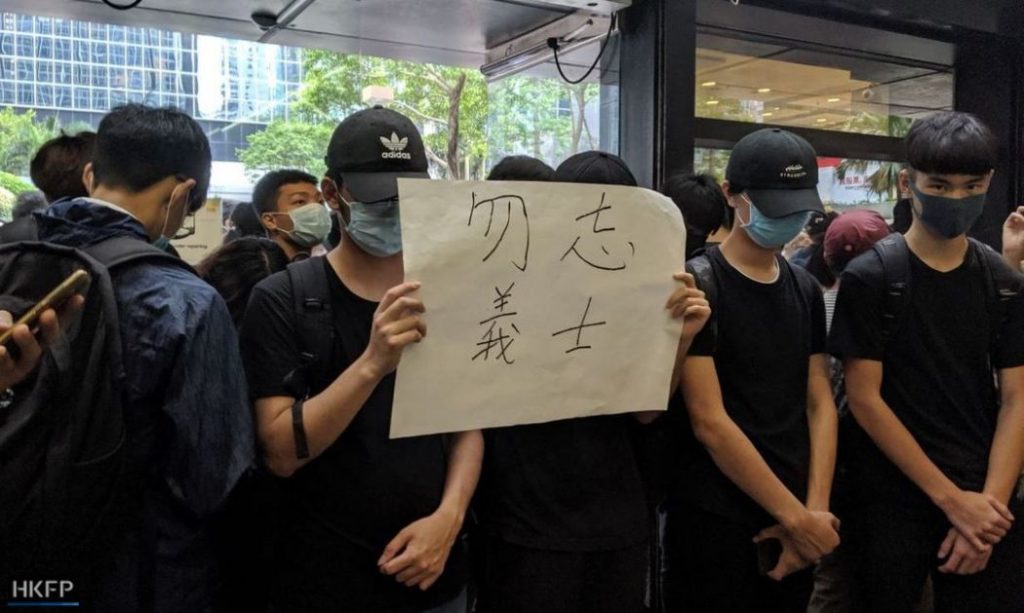 “Don’t forget our arrested comrades”
“Don’t forget our arrested comrades”
22/6/19:
China, Hong Kong: blockade of main road and cop HQ ends
21/6/19:
China, Hong Kong: anti-extradition protesters block main road“Protestors in Hong Kong have blocked a key road through the city centre and massed outside police headquarters to demand the total withdrawal of a controversial extradition law, the release of detained activists and apologies for police brutality.”
16/6/19:
China, Hong Kong: protesters bed in for a night around government HQ as over 25% of the population demonstrate Doubtless some ultra-leftists will point out the obvious – the ideological illusions in bourgeois democracy. However, this is a movement against things getting considerably worse, rather than a clearly positive pro-democracy movement. Apart from the fact that HK is hardly a bourgeois democracy insofar as only half of the deputies are elected, fantasies that the West are in any way on their side other than with their vapid words are not that prominent as far as I can see. Hopefully the masses in Hong Kong will eventually realise that the bourgeois democracies are only too happy to collaborate with China (see this, about George Bush snr. collaborating with China shortly after the Tiananmen Square massacre, or this recent report on the Belgian state’s collaboration with the Chinese state’s repression of Muslims). The main danger now is that the release from prison of one of the 2014 Umbrella Movement leaders could well mean he’ll be used to pacify the most radical section of youth, which so far has rejected leadership.
12/6/19:
China, Hong Kong: demonstrations persist as extradition bill is delayed…cops use rubber bullets, bean bag rounds, tear gas, pepper spray & batons to stop protesters storming city’s parliament…“Treated like prey” – account of person shot at and badly injured by cops
Video showing cops forced, at one time, to retreat
More here“Riot police turned downtown Hong Kong into a tear-gas covered battlefield as they pushed back against protesters who tried to storm Hong Kong’s Legislative Council. The protesters, angry at an extradition bill that would allow people to be sent to mainland China for trial, hurled bricks, bottles and umbrellas as they clashed with the police, as the demonstrations intensified on Wednesday afternoon.” More here “Protesters were seen wearing helmets, goggles and heavy-duty workman’s gloves, and pulling bricks from the sidewalks…dear my hong kong, you’re particularly beautiful today….a young person on the frontline: “We can’t lose again, because if we do, we lose everything!” And then he charged forwards….When protesters stormed the barricades outside the LegCo building, police responded with tear gas and rubber bullets, leading to at least 72 hospitalizations….Tear gas grenades extinguished almost immediately with water….Angry auntie shout at the police…Cops tried to pacify her with some snacks but she refused to take it…she’s asking if the police want to send her back to china, and when he tried to offer her a snack cos she’s “tired” she said “i don’t take things from running dogs”
 Bus driver risking his job (and maybe worse) to barricade road
Bus driver risking his job (and maybe worse) to barricade road
For greater details about what’s happening see:
“Why Hong Kong is protesting” “At the Hong Kong literary festival in November, a friend accompanied me at all times, for fear I’d be secretly kidnapped and smuggled to China. If the extradition law passes, any critic of Xi’s regime could be legally, openly abducted….It’s not only “Hong Kong people” whose fate is at stake here. Anyone passing through Hong Kong airport could be detained and sent to China (compare the Huawei Vancouver extradition case). Even people who have been extradited by a third jurisdiction to Hong Kong could be subject to re-extradition to China…Some alleged offenders are never brought to trial in China. Think former Party General Secretary Zhao Ziyang, detained without any legal process for the last 16 years of his life!!…The feeling in #HongKong is that the police have “gone crazy”, are “out of control”….In Hong Kong’s hybrid political system — a result of British colonial tradition as much as Communist control — only half the seats in the legislature are filled by popular elections. Most of the other half of the seats are filled by industry and business groups, and China’s booming economy means Beijing enjoys greater leverage over the Hong Kong economy now than it did even a decade ago, especially in finance.“
Young, leaderless demonstrators learn lessons from the past “…unlike five years ago, the protesters – a majority of whom seem to be in their early 20s – were noticeably more leery of cameras, either of police officers or journalists. They repeatedly reminded each other to put on face masks “to protect themselves”, reluctant to have their pictures taken, even less their identity revealed while being interviewed. Over the past week in the lead-up to the protests, tens of thousands of Hongkongers exchanged tactics on how to block lawmakersfrom scrutinising the embattled extradition bill on Wednesday through several encrypted channels on Telegram….a 31-year-old freelancer…said the lack of a clear leader or organiser this time actually allowed people from a broader swathe of society to make common cause again….”Unlike the Occupy days when there was a lot of finger-pointing, we have now come to respect each other more.”” More here “…people were reluctant to reveal their identity to reporters, refusing to be photographed and mostly declining to give their names and ages. When a Guardian reporter was interviewing a teenager in an underground station on Wednesday, his friends swiftly pulled him away…. knowing that the government often ignored peaceful expressions, the youngsters increasingly believed they had no choice but to resort to radical actions.”
Surveillance Fears Shadow Hong Kong Protests “Hong Kong’s protesters had mobilized on Wednesday as if they’d been trained for years. Anyone who needed a helmet, mask, or umbrella would yell to the sky. Those around them would stop, passing the message instantly through the crowds with unified chants and matching hand motions: patting their heads for a helmet, cupping their eyes for goggles, rolling their arms for cling wrap, which they were using to protect exposed skin from tear gas and pepper spray….Many of the protesters are college-aged and digitally savvy. They took pains to keep from being photographed or digitally tracked. To go to and from the protests, many stood in lines to buy single-ride subway tickets instead of using their digital payment cards, which can be tracked. Some confronting the police covered their faces with hats and masks, giving them anonymity as well as some protection from tear gas….On Wednesday, several protesters shouted at bystanders taking photos and selfies, asking those who were not wearing press passes to take pictures only of people wearing masks. Later, a scuffle broke out between protesters and bystanders who were taking photos on a bridge over the main protest area….At some point people called for drones being on the air. Everybody opened their umbrellas. I’m amazed by the level of organisation… Having been in hundreds of protests myself, this is the first time I felt protestors know what they’re doing….“Those who did 2014 know that peaceful methods are not working”
10/6/19:
China, Hong Kong: clashes with cops as 100s of thousands demonstrate against extradition law See also entries for 9/6/19 & 7/6/19 here
9/6/19:
Massive demo against extradition law “…suspicions that the initiative for the law had come from Beijing were bolstered last month when Politburo member Han Zheng voiced his support for it and revealed that its targets included foreigners who had committed crimes against Chinese national security outside China and who had passed through Hong Kong.”
7/6/19:
New repressive developments in Hong Kong “…the city’s legislators are pushing ahead with the controversial extradition law that will give mainland China the right to request the transfer of alleged criminals….”
30/3/19:
Hong Kong: sad sacrificial notion of Occupy Hong Kong as city awaits result of trial of activists
23/1/19:
Hong Kong: insulting China’s national anthem to be made a crime with maximum 3 years’ imprisonment
6/1/19:
Report on one of the founders of Hong Kong’s 79-day Occupy movement before he went on trial X writes: “This allows us a somewhat lengthy look into the mind of a Chinese democrat, and a reminder that the Chinese intelligentsia still has a tendency to succumb to Confucian behavioral norms.”
3/11/18:
Anti-China art exhibition in Hong Kong closed following threats from Beijing This is certainly not to defend the ideology and practice of “art”, but to illustrate how the bureaucracy’s hierarchical censorship is extending itself to the supposedly more ‘open’ Hong Kong area.
31/10/18:
Closure of last Hong Kong bookshop selling books banned on mainland
25/9/18:
Hong Kong Bans Pro-independence Party More here…and here . X writes: Right after the fuckers opened the high-speed rail line from the mainland so they can run heaps of pigs into the city at a moments notice – the same way they sent (some of the) soldiers into Beijing in 1989. More on the high speed railway line opening ceremony
9/9/15:
China, Hong Kong: new “Occupy” as minibus drivers block traffic protesting driving ticket fines
2/3/15:
China, Hong Kong: new clashes with cops
26/12/14:
China, Hong Kong: more clashes
23/12/14:
China, Hong Kong: cops use tear gas against continuing protests by several hundred people
2/12/14:
China, Hong Kong: protesters reject leaders’ call to surrender
1/12/14:
China, Hong Kong: clashes with cops escalate
26/11/14:
China, Hong Kong: protesters erect barricades in running battles with cops…6000 cops swamp area… “Black versus Yellow” – interesting text (from the beginning of October) about Hong Kong
China, Hong Kong: as the movement seems, though maybe only temporarily, to be moving backwards into a reliance on negotiations between leaders and would-be leaders…this long interesting text from people who seem to know their stuff appears(though, I admit, I’ve read less than half of it so far)…whilst the state-manipulated attacks on demonstrators has lead to the end of the talks with the government, on the level of ideas and critiques, people seem to be more disarmed than 200 years ago, ideologies of “democracy” colonising their brains
29/9/14:
China, Hong Kong: more secondary schools go out on strike as vale of tear gas envelops city…students accuse “occupy central” of hijacking their movement So nice to see such a neatly and correctly handwritten version of this old slogan from 46 years ago – sadly, only 1 of these women looks enthusiastic about it. No surprise – so far this is no May ’68. The old slogan is pertinent – but not yet pertinent to the current ideologies in Hong Kong. The slogan used there (and, I must emphathise again – so neatly and correctly written!) is clearly contradicted by a boringly possible demand submissive to our masters’ notion of what’s realistic – a demand for something capitalism could grant. A more “democratic” form of bourgeois election than that proposed by the current alliance of the Hong Kong elite with the mainland CP bureaucracy might feasibly be granted if it suited the various interests as well as helped suppress any independent elements developing within the movement there. Sure, this might admittedly also involve a potentially explosive resolution of the conflicts of interest going on within and between the different capitalist camps: some are even talking of potentially changing the situation to what happened in Ukraine, even though the histories and ideologies are relatively very different…Clearly the conflict between pro-US and pro-Communist Party bureaucratic interests involves them assessing the danger of things getting out of control. Insofar as what goes on there is of concern to those wanting some global independent opposition, it’s obviously worth attempting to look behind the spectacular facade of opposing interests and try to work out what’s going on. For instance, check out this contemptuous pro-bureaucracy report here, which nevertheless mentions some pertinent contradictions.
So nice to see such a neatly and correctly handwritten version of this old slogan from 46 years ago – sadly, only 1 of these women looks enthusiastic about it. No surprise – so far this is no May ’68. The old slogan is pertinent – but not yet pertinent to the current ideologies in Hong Kong. The slogan used there (and, I must emphathise again – so neatly and correctly written!) is clearly contradicted by a boringly possible demand submissive to our masters’ notion of what’s realistic – a demand for something capitalism could grant. A more “democratic” form of bourgeois election than that proposed by the current alliance of the Hong Kong elite with the mainland CP bureaucracy might feasibly be granted if it suited the various interests as well as helped suppress any independent elements developing within the movement there. Sure, this might admittedly also involve a potentially explosive resolution of the conflicts of interest going on within and between the different capitalist camps: some are even talking of potentially changing the situation to what happened in Ukraine, even though the histories and ideologies are relatively very different…Clearly the conflict between pro-US and pro-Communist Party bureaucratic interests involves them assessing the danger of things getting out of control. Insofar as what goes on there is of concern to those wanting some global independent opposition, it’s obviously worth attempting to look behind the spectacular facade of opposing interests and try to work out what’s going on. For instance, check out this contemptuous pro-bureaucracy report here, which nevertheless mentions some pertinent contradictions.
See also here: “Occupy Central and the pan-Democrats have intervened in a bid to ensure that the protests remain limited to the narrow demand for open chief executive elections. They represent layers of the corporate elite and upper middle classes who fear that Hong Kong’s position as a major Asian financial center and their own interests will be undermined by Beijing’s control over the former British colony….As part of its “pivot to Asia”, the Obama administration signaled that it intended to step up the pressure on “human rights” in Hong Kong with the appointment last year of veteran diplomatic Clifford Hart as the new US consul. In his first public statements,…There are undoubtedly close links between the US and sections of the Occupy Movement and the pan-Democrats…. leaked emails between prominent media tycoon Jimmy Lai and his top aide Mark Simon revealed that he had supplied funds to the Occupy Movement and several pan-Democrats. Simon, a former US naval analyst, had been the head of the Hong Kong branch of Republicans Abroad and organized meetings with leading US figures. In May, Lai reportedly met with prominent neo-con and former deputy defense secretary Paul Wolfowitz. At the same time, the Occupy Movement and pan-Democrats are concerned that the protests not become the focus for the broader social demands of the working class. The social gulf between rich and poor in Hong Kong is particularly marked. A small wealthy elite of billionaires and multi-millionaires lives in luxury while a fifth of Hong Kong’s population is below the poverty line. Income tax and corporate tax rates are among the lowest in the world. Welfare measures are virtually non-existent…. a tearful Occupy Movement founder Benny Tai had expressed concerns that “the situation was getting out of control.” It is a concern that all sections of Hong Kong’s ruling elite share — both pro-Beijing and “pro-democratic.””
And this, about the Big Four audit accountancy firms is interesting: “The audit firms, who between them had global revenues last year of £66.3bn and employ more than 700,000 people worldwide, joined the fray by placing adverts in three Chinese-language newspapers criticising Occupy Central, which has suggested it will stage a sit-in to block traffic in Hong Kong’s business district as part of its campaign. The advert said: “We hereby announce that we are opposed to this movement, and are concerned that ‘Occupy Central’ would have negative and long-lasting impact on the rule of law, the society and the economy of Hong Kong. We hope that the disagreements could be resolved through negotiation and dialogue instead.””
Whilst thisexpression of business interest implies a fear that the state could provoke excessive opposition by being too heavy-handed: “WHAT is worse for big business in Hong Kong: street protests, or the tear gas fired to disperse the protesters? That is the uncomfortable question now confronting Hong Kong’s button-down business community, which has co-existed relatively peacefully with the city’s Communist Party overlords since the handover to Chinese rule in 1997…. For now, the protests are an inconvenience, but they are surely not enough to force a major Western company – or even a Chinese state-owned company – to seek a new headquarters, especially in an age when most employees can probably operate from home indefinitely. Hong Kong’s political and financial advantages are too great to be overshadowed by barricaded subway stops and college students blocking downtown arteries. But the same cannot be said of a city that responds to peaceful student protests with tear gas….Hong Kong’s handling of the protests…suggests a government that lacks the competence to do what other world cities do regularly: peacefully manage a student protest.If Hong Kong’s business community hopes to preserve what is unique about their city….they need to be just as vocal about the negative consequences of assaulting unarmed students as they have been about threats to shut down the central business district. It’s time for them to reaffirm how a world-class business city should behave under duress.”
But of course, the main thing is to write our slogans neatly and correctly!!! “Be realistic – demand impeccable handwriting!”
28/9/14:
27/9/14:
China, Hong Kong: “Occupy Central” reschedulesThe implicit aim of this movement, regardless of it’s ideology of “demockracy”, is dictatorship of the bourgeoisie (local and multinational) as against dictatorship of the Chinese Communist Party bureaucracy. Whether the momentum goes beyond these false (externally defined) choices is, for the moment, largely futile speculation. But there are signs that things are – at least a bit – getting out of control of the professional activists of “Occupy Central” (e.g. the latest intensification of conflict, with the breaking into the main government compound, and the boycott of secondary school classes, has forced “Occupy Central” to re-schedule their long-planned occupation). Nevertheless, if there’s to be no sell-out or re-organisation of current misery or worse, independent forms of action have to also develop independent content, independent ideas that contest the ideologies that make such movements “respectable”. See also This Riot Is Not In Ferguson, It Is In Hong Kong“The police have used disproportionate force to stop the legitimate actions of the students and that should be condemned,” said Benny Tai, one of the three main organizers of the pro-democracy Occupy Central movement.” – implying that proportionate force would be fine, being the force this guy would probably claim he’d use if developments were to see him in charge of the filth.
26/9/14:
China, Hong Kong: interesting development, boring demand, as 12 year old pupils boycott classes(more here and here)
2/7/14:
China, Hong Kong: 500 arrested after sit-in
1/7/14:
China, Hong Kong: clashes with cops on demo demanding “real democracy” (whatever that means)
18/4/13:
China, Hong Kong: port strike widens as strikers pitch tents outside company’s 70-storey building (more here)
31/3/13:
28/3/13:
China, Hong Kong: clash with guards as dockers start sit-in strike demanding 20% wage increase
11/4/11:
Footnotes
i For details see this : https://qz.com/1636663/the-37-crimes-included-in-hong-kongs-proposed-extradition-law/ . It’s worth pointing out that illegal extradition – termed “Extraordinary Rendition” has long been used by “the free world”. And China already operates similar things in Taiwan. And not just there: “Kidnappings beyond its jurisdiction have brought the PRC no major negative consequences, opening the door to more cases like that of Gui Minhai (桂民海), the Swedish editor abducted in 2015 in Thailand.” (here) The snatching of citizens of other putatively “sovereign” countries is something that the PRC has made a habit of for some time – it has arrogated to itself complete command over every individual of Chinese “nationality” that resides in China or anywhere else. The contentious law of extradition now being used to undermine the remaining bourgeois rights of HK civil society is merely the imprimatur of official “legality” by the local colonial office to sanitize an already routine arbitrary seizure of troublesome people at the will of the CCP. Even Australian kids – though not through extradition – are trapped within China with no complaint from the Australian state. And many Chinese Uighurs who have permanent residency in Australia are fearful of ‘rendition’ also. And here’s a report on a vile little shit who hoped to cash in on extraditing a Chinese dissident from US (impalement is too good for him: he’s beyond the pale).
ii It’s worth pointing out a development in drone technology that so far has not been used (as far as I know) : http://www.siliconrepublic.com/digital-life/item/37317-airborne-riot-control-pepp? “The drone features four high-powered gas propelled chambers, each of which is capable of firing 20 pellets per second. It is also capable of firing other similar-sized pellets, including paintballs and solid plastic balls with an ammunition capacity of 4,000 pellets. While the company has not disclosed the recipients of these mobile projectile dispensers, Desert Wolf’s managing director Hennie Kieser told the BBC that many of them are based in South Africa. “Some (are) mines in South Africa, some security companies in South Africa and outside South Africa, some police units outside South Africa, and a number of other industrial customers.” …but even drones are not immune from a crowd’s desire to enjoy themselves (more here) “After a light tap from an unidentified object on its left side, a black Kings T-shirt knocked the drone on the right and sent it careening down within arm’s reach of the fans. Video footage shows the drone getting pulled into the mass, where it was smashed to bits by a skateboard”. However, attacking drones or sheltering from them by using umbrellas necessitates that one recognises a drone when you see one. China can now get round this by using drones that look like doves for surveillance (and in France, the state is training eagles to bring down hostile drones ).
iii More than just ‘sad’ are the ideological expressions of how wonderful this margin of freedom is. Whilst no-one wants their lives to get worse, which given this catastrophic epoch is almost inevitable outside of a growing social movement to fundamentally change the world, articles by this French admirer of the neoliberal Macron (see, for instance this) praising the Hong Kong movement whilst parading the ‘universalism’ of republican values, just contribute to illusions in ‘democracy’, the very ideological manipulations that were used by the French ruling class to justify going to war with Germany in 1914, leading to the massacre of over 1,500,000 soldiers on the French side. She talks of “the right to speak freely”, which conveniently ignores the very obvious fact that if you exercise your “right” to free speech to a teacher, to a boss, to a cop, etc. you find your speech is not so free at all. Besides, speech is colonised by the monologuers of the media, and inculcation by the official educators and of all the dominant forces of pseudo-communication. Originally, in the 18th century in France and beyond, the demand for “free speech” had something radical about it, insofar as it opposed the monopoly of ideological expression spouted by the monarchy, the aristocracy and priesthood. But the ruling class are the only section of society who have the power to put their free speech into effect, whose ideas have the most obviously concrete consequences; for the rest of us, it’s a constant battle to express ourselves freely, and we do it at risk of being imprisoned or crushed in other ways. An example of this in France at the present are the arrests for the crime of ‘outrage’ of some people I know a bit, who have been accused of chanting “A cop who commits suicide is half-forgiven” – the prosecution is calling for the maximum sentence of 2 years in prison (meanwhile, the killing in Marseille of an 80-year-old woman closing the shutters of her flat by cops firing teargas grenades on a ‘yellow vest’ demo last December has led to no prosecutions whatsoever).
Democracy or Totalitarianism?
Democracianism or Totalitairiacy?
To quote T: “Democracy, like all other tools for the false unification of antagonistic forces, is based on abstract concepts: “rights”, “justice”, “equality before the law” “rule of the majority” etc. Their abstract nature conceals (and meant to conceal) their concrete use. “Rights” are an historical product of a violent war between owners and non-owners which produced and reproduces capitalism and its classes, its money and wage-slavery, their inherent misery and contradictions. Rights were created at a certain point when the bourgeoisie and its copy-writers were forced to come up with a way to reform its exploitation and abuse, to refine their methods of enslavement. As subordinates of a hierarchical power, we are “granted” rights after-the-fact, after that same power had already taken by force our freedom to create and decide about our so-called lives. One of the biggest lies is the “right” to be a slave and to exchange the life that is stolen from you every day for crumbs of survival and alienation. You now have judicial rights that (only technically) guarantee some level of this survival, abstract equality and a “just” legal procedure only because the owners of society were forced to grant those rights when the fierce resistance of the slaves (traditional slaves and wage-laborers) became a real threat to the entire system of production and its hierarchy. The revolts and insurrections that forced the owners to abolish the traditional forms of slavery have not yet brought about the total abolition of slavery, only its modernization and its accompanied rebranding, an official equality for everyone in the powerlessness over their own lives.
Everyone in a democracy is “equal” before the laws of governance and the justice systems that are perhaps dictated and ministered by democratically elected bureaucrats, but are inherently designed in such a way so that not only they cannot change the established order of alienated life, private property, owners and non-owners, of those who decide and those who take orders – they also reproduce and anchor in our minds a mystical belief in the absolute rightness of those systems and the order they protect. But everybody knows, even those who are still under the mystique of this alleged “lesser of evils of all forms of government”, that even the rights and the “welfare” that are given to us under the law are corrupted daily and in secrecy, without possibility of redress. Judicial law will always be subordinate to the more fundamental laws of this society.”
iv Due to technical problems, this footnote is divided into 2 parts, firstly about Google, then about Germany.
On 18/12/18 Google stepped back from its Big Brother collaboration with the Chinese bureaucracy. This was essentially because principled individuals within the company exposed the machinations of the Google techno-authoritarians, but it seems like it was only a temporary retreat. Developments of this kind are expressions of core capitalist values and should be expected by all those who have an inkling of how the system works. The other half of the subject matter covered in this article illustrates the degree to which capital has become entangled with the business of legitimizing authoritarianism – openly, on a contractual basis. In Ocotber 2018, Google’s CEO defended helping the Chinese bureaucracy’s censorship plans, a reversal of a decision from about eight years ago, when Google pulled its search engine, which was also censored, from the Chinese market. The CEO said the time had come to reevaluate that choice. “It’s a wonderful, innovative market.”, he enthused so as to justify the logic of capital accumulation by working for the genocidal Chinese police state. Also notable was the opposition within the company. In September 2018 Google’s upper management forced employees to delete a confidential memo detailing the censored search engine the company was planning to launch in China, indicating a certain similarity between the surveillance the Chinese state imposes on its citizens and that which Google imposes on its workers. In August 2018 , there’d been some resistance to Google’s collaboration with the totalitarian state in the form of a petition against this project, but it’s indicative of the climate of fear in the company that one of the employees who helped organise it wished to stay anonymous (see also this).
iv2: Germany: And in May this year the German state allowed for detention without trial for up to 35 days for those who the state thinks might commit a crime. This law is called the “Polizeiaufgabengesetze” (police tasks laws), which were first introduced in several German “Länder” (regions) last year. These laws give the police the right to arrest suspects in certain cases to prevent them from committing a crime, to imprison them, BEFORE they have done anything against the law. There is no trial but the person would just be released after the event the “suspected threat” refers to is over – e.g. a football match or a political summit.
There was a lot of public outrage against these laws last year and large mobilizations by a broad spectrum from liberals to Leninists to more radical factions. In the end, the politicians made some minor changes (specifically, reducing the detention period from 74 to 35 days) which preserved the essence of the laws and passed them. True to current Kafkaesquisms, those arrested are not informed of any offense they are suspected of being about to commit. [altered on 26/6/19 from original 23/6/19 version]
v Democracies’ interaction with more fascistic forms is not confined to censorship of course. For instance, read this report about a Hong Kong-based American security company, whose head was responsible, under the aegis of the US state, for killing 14 unarmed Iraqi civilians, helping the Chinese ruling class to set up a training centre in Xinjiang.
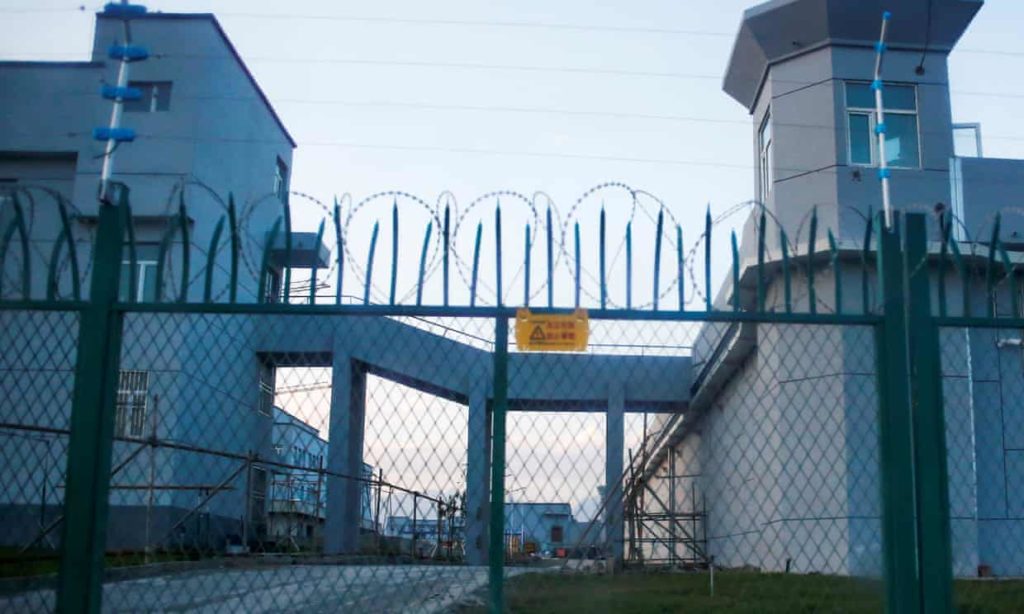
Education Macht Frei – Vocational Education Centre, Dabancheng, Xinjiang
And there was a recent report showing British cops training Sri Lankan war criminals in riot practice.
vi As an example of how totalitarianism is beginning to develop also in a country widely believed to be resisting neoliberal forms of this totalitarianism, it’s worth noting this : a social network site in France set up a collection at the beginning of January this year for an ex-boxer, Christophe Dettinger, who punched a cop during a ‘yellow vest’ demo and later got a 30 month jail sentence. The state not only blocked the bank account of this collection (they’d accumulated over 100,000 euros in just 2 or 3 days) but also officially summoned 56 of the people who’d donated money to this site – apparently anonymously – to explain themselves at their local police station.
vii ![]() A few people only see in Facebook the epitome of a narcissistic culture whereby people voluntarily expose their intimate moments and personal life to strangers in order to get attention. They only see it as the playground for a pseudo-communication organized in the form of “likes” and a self-promotion on their own page, on their own media. Which, even if partially true, is a very narrow, reductionist, take on it. Elements that are putatively “personal” are part of an integrated order of generalized social control, as well as artifacts of the contemporary conditions of class struggle. Naive and vulnerable youth, growing up in a culture where Facebook is as banal a part of social life as TV used to be, write whatever comes into their heads and then find their innocent writings being used against them or to pressurise them at some later date.For instance, in August 2011 a young guy (in Wolverhampton, if my memory serves me well) wrote “Let’s have a riot in the town centre!” (or something like that) on his Facebook page. Despite taking it off Facebook after 20 minutes, he was arrested, tried and sent to jail for at least a year – for inciting a riot that never took place!
A few people only see in Facebook the epitome of a narcissistic culture whereby people voluntarily expose their intimate moments and personal life to strangers in order to get attention. They only see it as the playground for a pseudo-communication organized in the form of “likes” and a self-promotion on their own page, on their own media. Which, even if partially true, is a very narrow, reductionist, take on it. Elements that are putatively “personal” are part of an integrated order of generalized social control, as well as artifacts of the contemporary conditions of class struggle. Naive and vulnerable youth, growing up in a culture where Facebook is as banal a part of social life as TV used to be, write whatever comes into their heads and then find their innocent writings being used against them or to pressurise them at some later date.For instance, in August 2011 a young guy (in Wolverhampton, if my memory serves me well) wrote “Let’s have a riot in the town centre!” (or something like that) on his Facebook page. Despite taking it off Facebook after 20 minutes, he was arrested, tried and sent to jail for at least a year – for inciting a riot that never took place!
In addition, the idea that the kind of self-promotion one sees routinely in social media (esp. ones utilized for seeking work like Linked-In) are simply individual psychological aberrations caused by a purely voluntary engagement with Capital, fails to take into account the extent to which people are forced to market themselves in order to secure employment (and are thus another symptom of precarity) as a consequence of, amongst other things, the destruction and marginalization of the more traditional expressions of class struggle.
Also, an increasing minority of people use it for political discussion. And in France at least, it’s often been used – and this since 2010 – to gather people together for political reasons (in 2010 high school students used Facebook to organise strikes to support the anti-pension reform movement; in 2018 the yellow vest movement was initially started by Facebook discussions). And not just in France – Facebook contributed to the Arab Spring in Egypt (though, admittedly, this was much exaggerated by the Egyptian middle class, since the majority of participants didn’t have internet access).
Even amongst non-political teenagers, it’s been used for genuinely social self-organised events: http://dialectical-delinquents.com/articles/daily-life/france-facebook-festivals-may-2010/ .
Whilst the critique of narcissism is partly pertinent – it’s certainly worth critiquing the shallowness of individuals’ lives and communication partly resulting from what they ‘choose’ (within their ever-narrowing margins of choice) – it’s important to also look at what is not chosen and what is not narrowing, what is objective and partly and increasingly determinant – the widespread use of this information by businesses and the state, who gather this data for obvious manipulative purposes as well as to check for deviant tendencies (see, for instance, this recent new requirement for a US visa: https://www.bbc.com/news/world-us-canada-48486672 ).
Added, 18/8/20:
A WSJ report alleged Facebook India turns a blind eye to hate speech by people and groups linked to BJP.
https://www.aljazeera.com/ajimpact/modi-bjp-rejects-claims-preferential-treatment-facebook-200817131645458.html
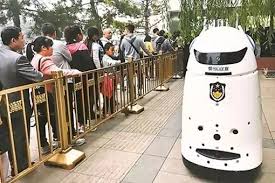



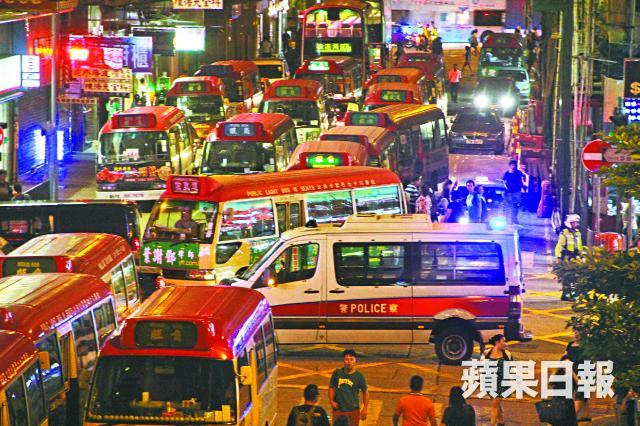
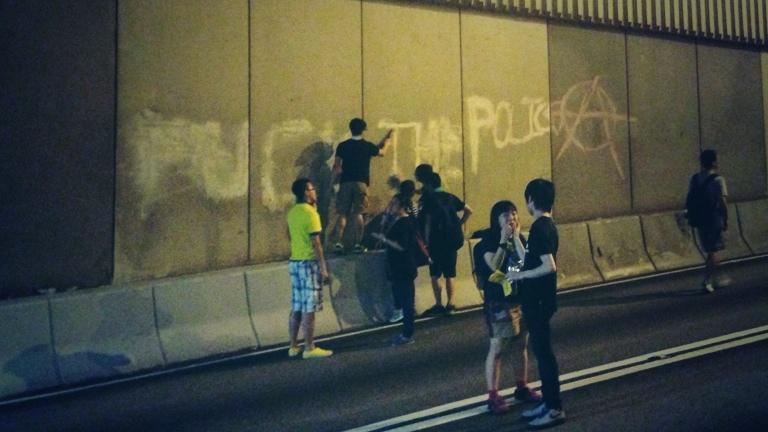
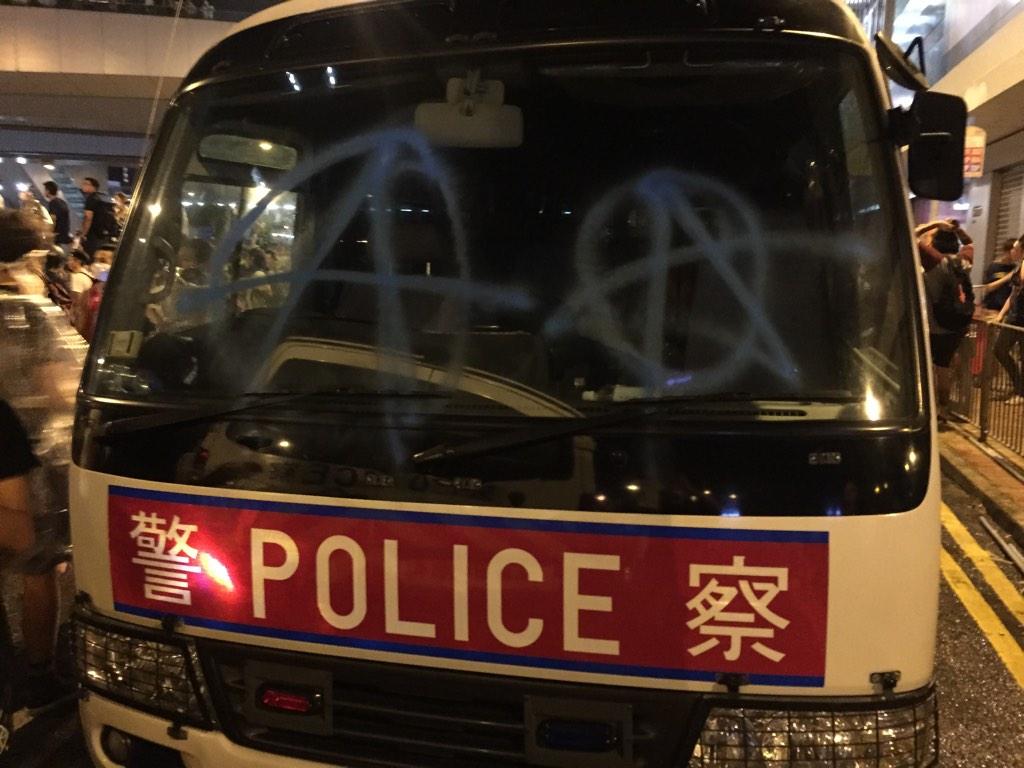
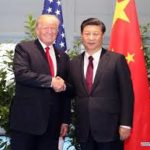
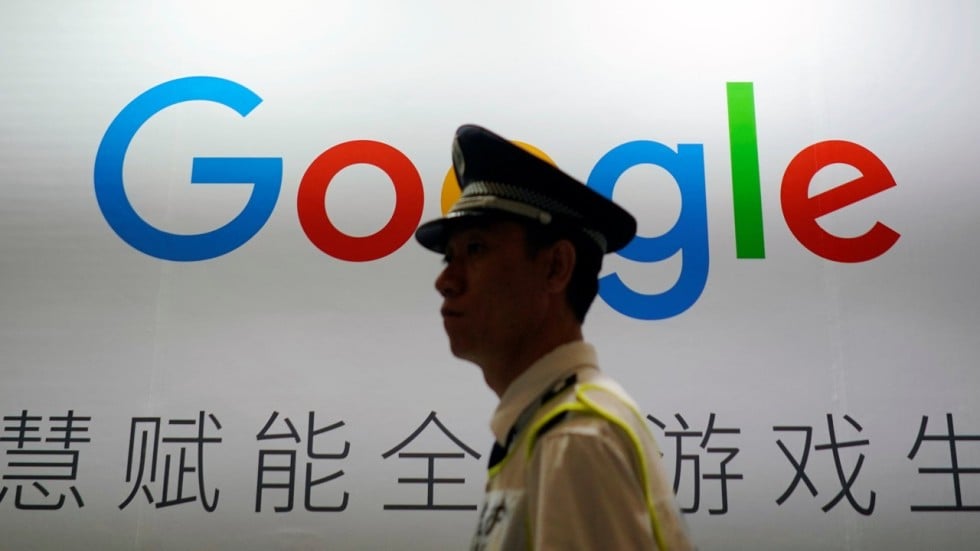
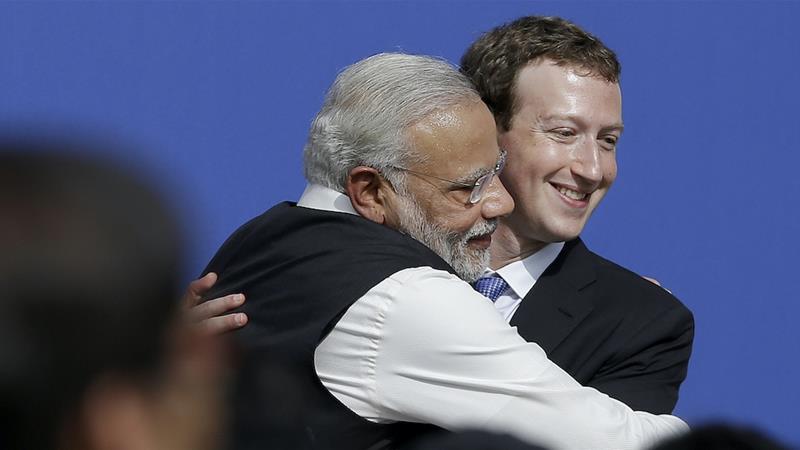
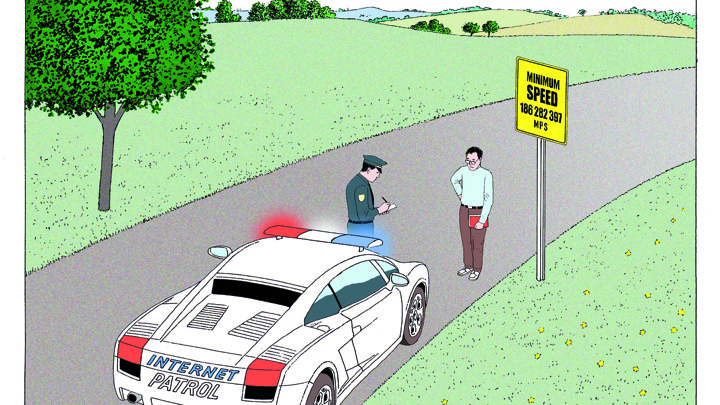
Leave a Reply to Sam FantoSamotnaf Cancel reply